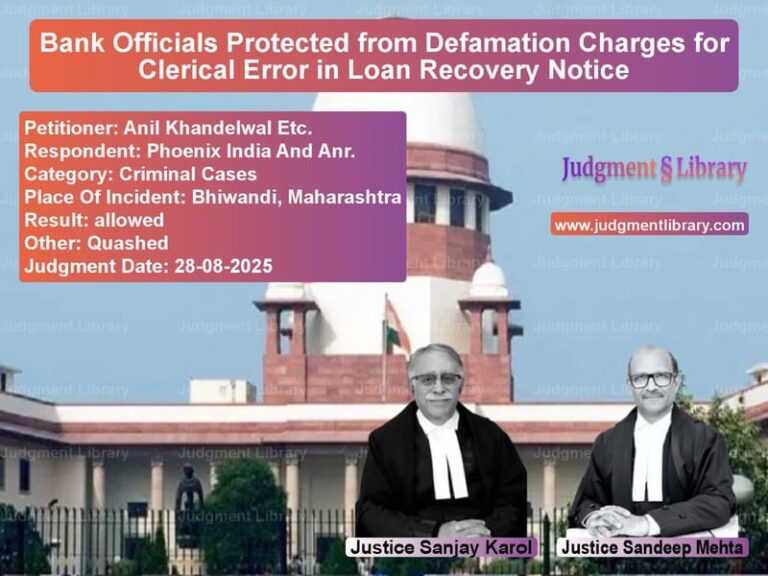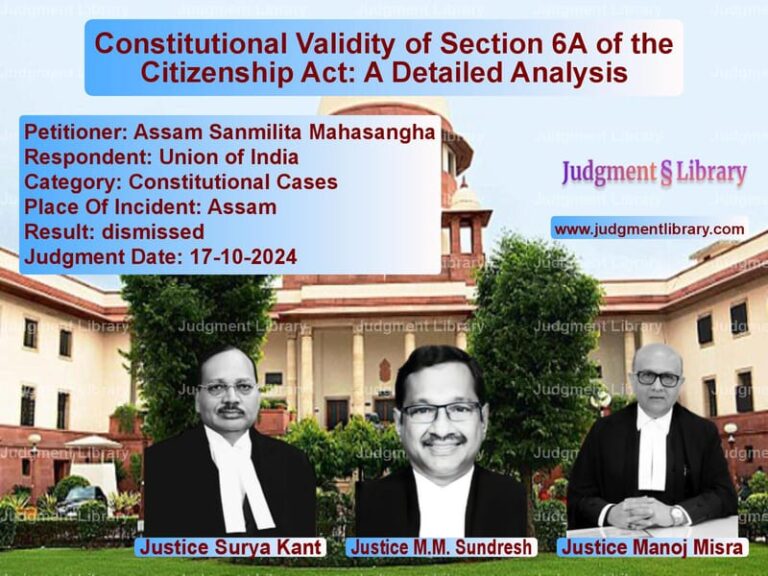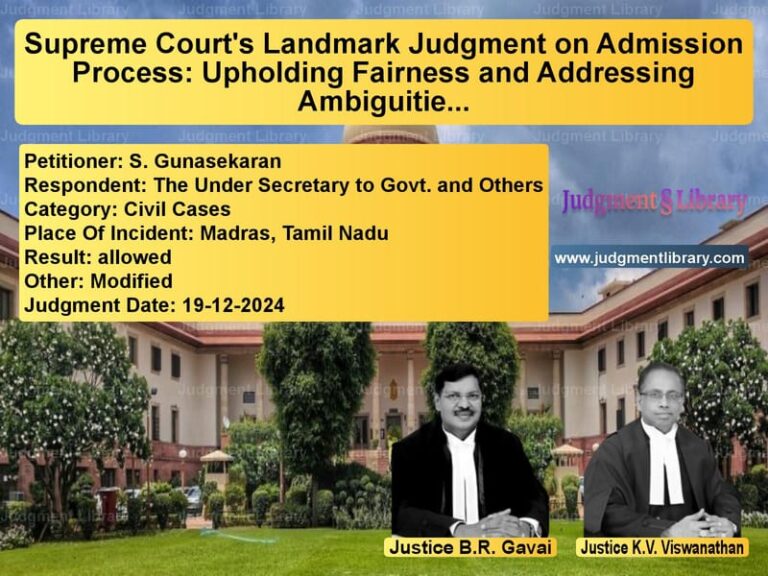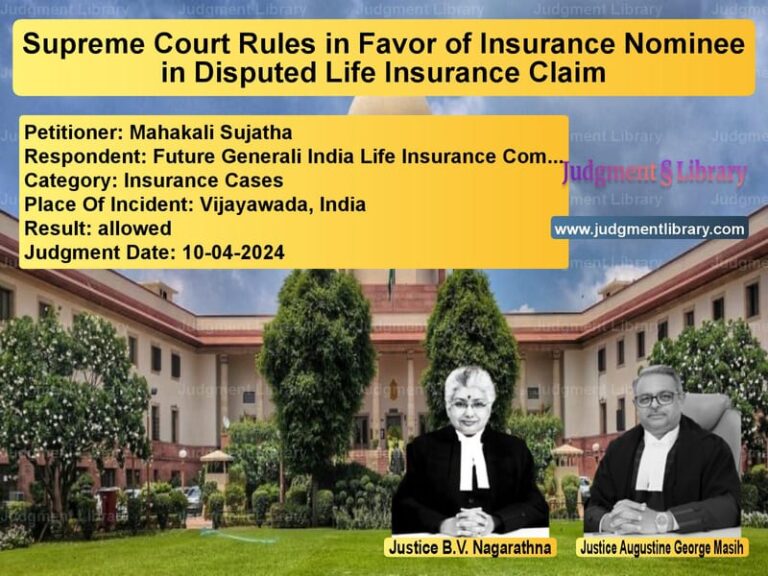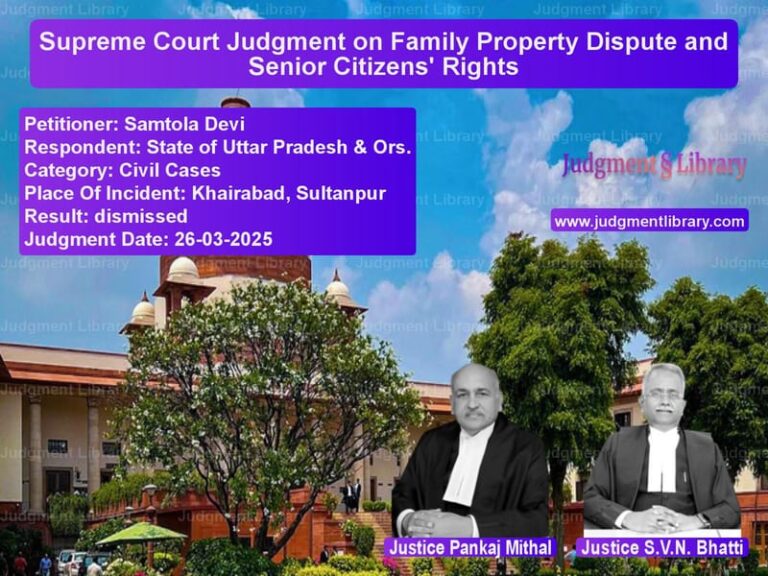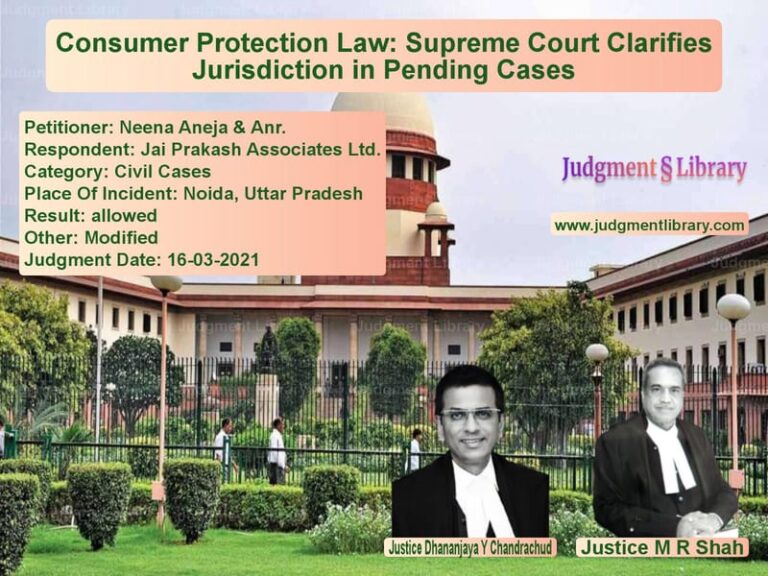Supreme Court Orders Refund of Stamp Duty in Fraudulent Property Deal
The case of Bano Saiyed Parwaz vs. Chief Controlling Revenue Authority and Inspector General of Registration & Others addresses the critical issue of stamp duty refunds in property transactions that fail due to fraud. The Supreme Court, in its judgment dated May 17, 2024, ruled in favor of the appellant, holding that the government cannot deny a legitimate refund claim based on technical limitations, particularly when the transaction was void due to fraudulent conduct by the seller.
Background of the Case
The appellant, Bano Saiyed Parwaz, entered into an agreement to purchase property bearing C.T.S. No. 340.340/1 to 340/14 of Kurla-1 Division, located at Fitwalla Cottage, Fitwalla Compound Bazaar Ward, Old Agra Road, Kurla (West), Mumbai-400070. The seller was Mohammed Hanif Ahmed Fitwala. To register the conveyance deed, the appellant paid a stamp duty of ₹25,34,400 on May 13, 2014.
However, before completing the sale, the appellant discovered that the vendor had already sold the same property to a third party in 1992. Despite conducting a public notice to verify ownership, no objections were raised before the transaction. Upon discovering the fraud, the appellant attempted to contact the vendor, but he was unavailable, forcing her to file a police complaint. Eventually, due to police intervention, the vendor executed a cancellation deed on November 13, 2014.
Legal Proceedings
To recover the stamp duty paid, the appellant:
- Applied online for a refund on October 22, 2014, under Section 48 of the Maharashtra Stamp Act, 1958.
- Filed a written refund application on December 6, 2014, along with supporting documents.
- The authorities rejected the refund request on the ground that the application was beyond the six-month limitation period.
Aggrieved by this decision, the appellant moved the Bombay High Court, which upheld the rejection, reasoning that the application was invalid since the cancellation deed was executed after the refund request.
The appellant then appealed to the Supreme Court.
Arguments by the Petitioner (Bano Saiyed Parwaz)
The appellant’s counsel contended:
- The fraud committed by the seller made the transaction void ab initio.
- The stamp duty payment was made in good faith, and the refund should not be denied based on technical limitations.
- She had pursued legal remedies diligently and was not negligent in her approach.
- The refund application was filed within the six-month period, as required under the Maharashtra Stamp Act.
- The rejection was based on a misinterpretation of Sections 47 and 48 of the Maharashtra Stamp Act.
Arguments by the Respondents (State Authorities)
The respondents countered:
- The appellant applied for a refund before executing the cancellation deed, making the application invalid.
- Under Section 48 of the Maharashtra Stamp Act, the last date to apply for a refund was November 12, 2014, whereas the cancellation deed was executed on November 13, 2014.
- The law mandates strict adherence to refund timelines, and exceptions cannot be made.
Supreme Court’s Observations
The Supreme Court ruled in favor of the appellant, holding that:
“The appellant was pursuing her legal remedies and was not negligent. She was a victim of fraud, and the government should not rely on technicalities to deny her a rightful refund.”
The Court emphasized that:
- Strict adherence to limitation laws should not override the principle of fairness.
- The appellant acted in good faith and took immediate legal steps upon discovering the fraud.
- The interpretation of Sections 47 and 48 by the authorities was flawed.
Legal Precedents Considered
The Supreme Court referenced its ruling in Committee-GFIL v. Libra Buildtech Private Limited & Others (2015) 16 SCC 31, stating:
“When the State deals with a citizen, it should not ordinarily rely on technicalities, and if the case is just, even legal defenses should not be used to deny justice.”
Key Findings and Judgment
The Supreme Court set aside the High Court’s judgment and ruled that:
- The appellant was entitled to a full refund of ₹25,34,400.
- The authorities must process the refund within three months.
- Technicalities should not be used to deny legitimate refund claims, especially when fraud is involved.
The Court stated:
“The appellant’s case is a just one, and she should not be denied a refund merely on technical grounds.”
Implications of the Judgment
This ruling has significant implications:
- Consumer Protection: Buyers deceived in property transactions now have stronger legal grounds to claim refunds.
- Government Accountability: State authorities must act fairly and not hide behind procedural loopholes.
- Fraudulent Transactions: Courts will prioritize justice over strict interpretation of technical laws in fraud cases.
- Stamp Duty Refunds: The decision sets a precedent for refund claims where transactions fail due to fraud.
Conclusion
The Supreme Court’s decision in Bano Saiyed Parwaz vs. Chief Controlling Revenue Authority reinforces the principle that justice must prevail over procedural technicalities. By ruling in favor of the appellant, the Court has ensured that innocent buyers are not penalized for fraudulent conduct by sellers and that government authorities uphold fairness in taxation matters.
Petitioner Name: Bano Saiyed Parwaz.Respondent Name: Chief Controlling Revenue Authority and Inspector General of Registration & Others.Judgment By: Justice B.R. Gavai, Justice Prashant Kumar Mishra.Place Of Incident: Kurla, Mumbai.Judgment Date: 17-05-2024.
Don’t miss out on the full details! Download the complete judgment in PDF format below and gain valuable insights instantly!
Download Judgment: bano-saiyed-parwaz-vs-chief-controlling-re-supreme-court-of-india-judgment-dated-17-05-2024.pdf
Directly Download Judgment: Directly download this Judgment
See all petitions in Contract Disputes
See all petitions in Property Disputes
See all petitions in Damages and Compensation
See all petitions in Judgment by B R Gavai
See all petitions in Judgment by Prashant Kumar Mishra
See all petitions in allowed
See all petitions in Refund Ordered
See all petitions in supreme court of India judgments May 2024
See all petitions in 2024 judgments
See all posts in Civil Cases Category
See all allowed petitions in Civil Cases Category
See all Dismissed petitions in Civil Cases Category
See all partially allowed petitions in Civil Cases Category


